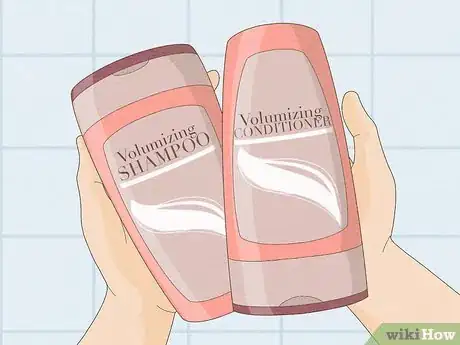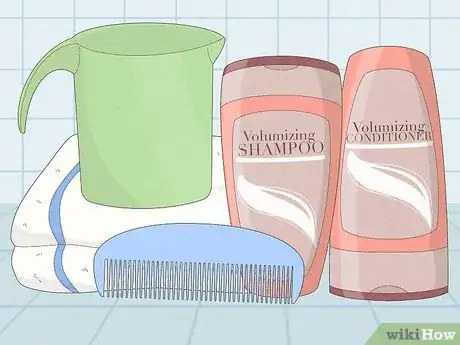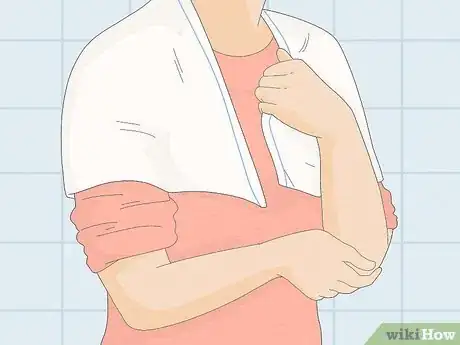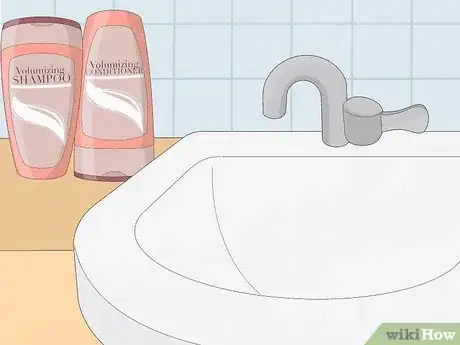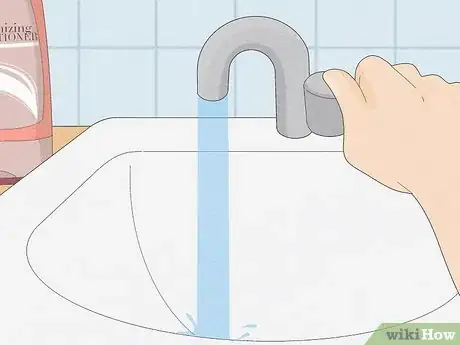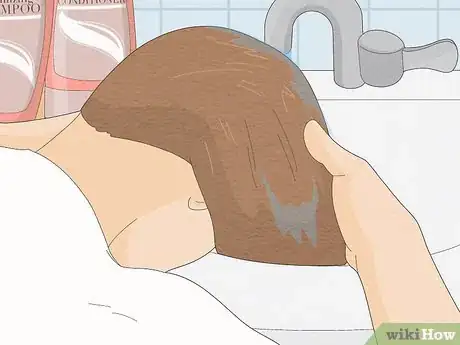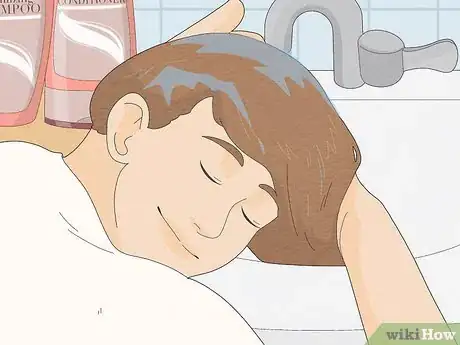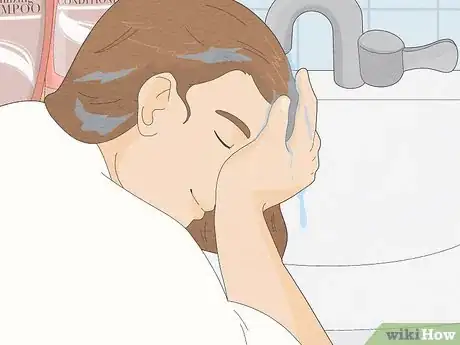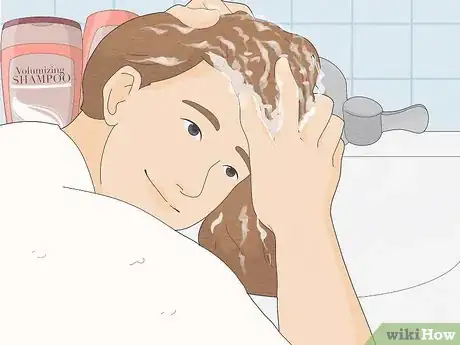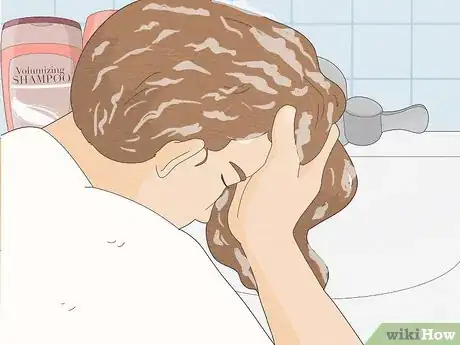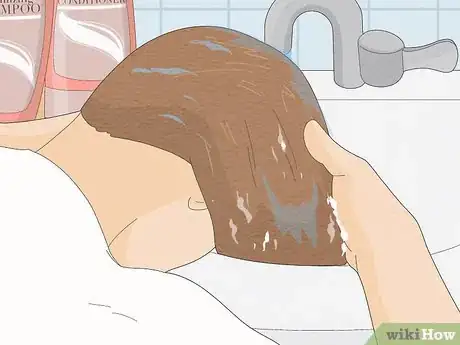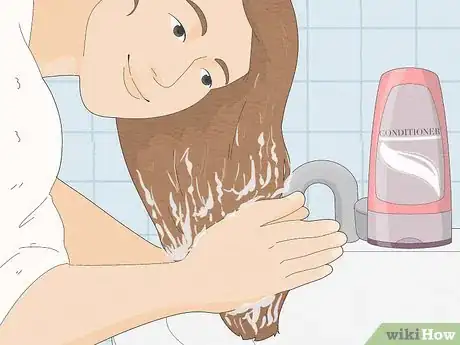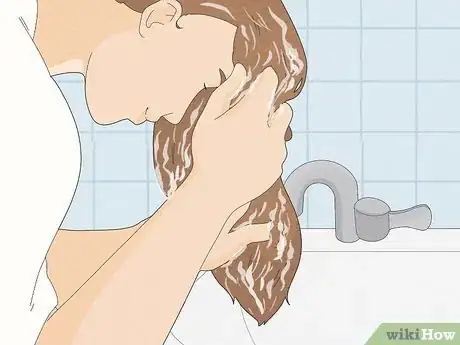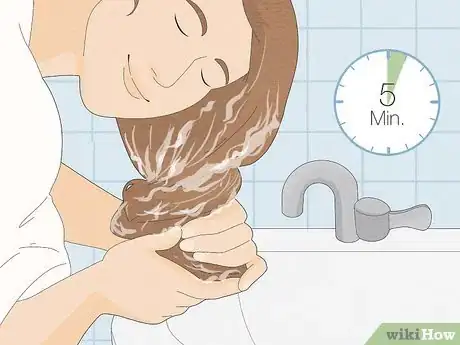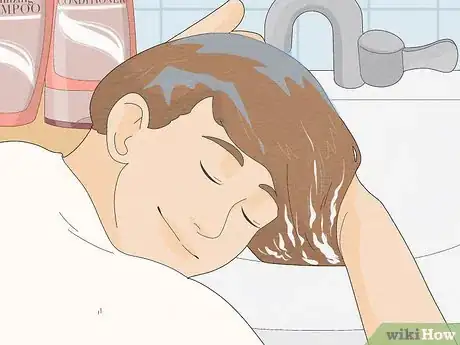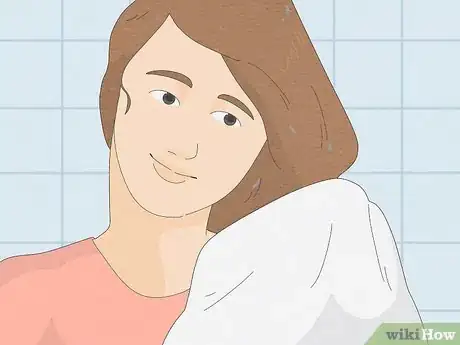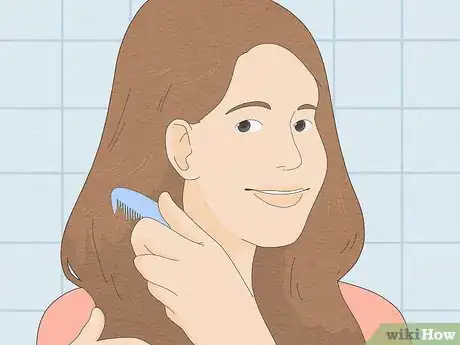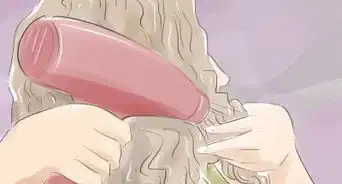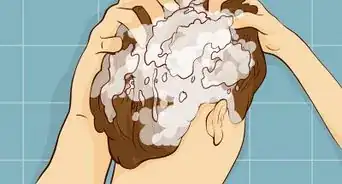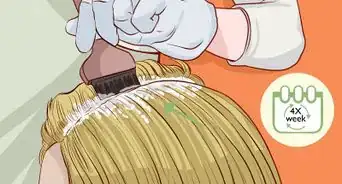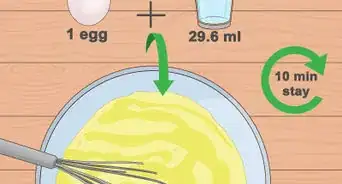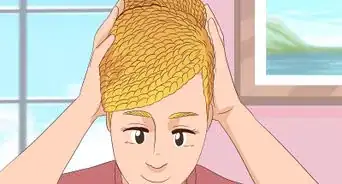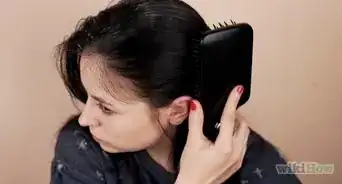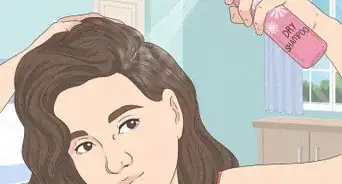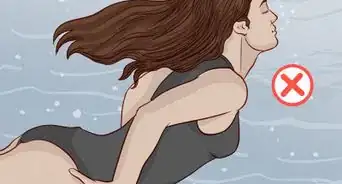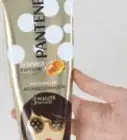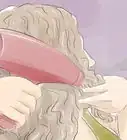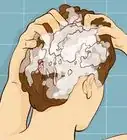This article was co-authored by Courtney Foster. Courtney Foster is a Licensed Cosmetologist, Certified Hair Loss Practitioner, and Cosmetology Educator based out of New York City. Courtney runs Courtney Foster Beauty, LLC and her work has been featured on The Wendy Williams Show, Good Morning America, The Today Show, The Late Show with David Letterman, and in East/West Magazine. She received her Cosmetology License from the State of New York after training at the Empire Beauty School - Manhattan.
There are 9 references cited in this article, which can be found at the bottom of the page.
This article has been viewed 136,068 times.
There are numerous reasons why you may not want to wash your hair in the shower. Perhaps you are in a hurry, perhaps you just got a new tattoo, or maybe you wear hair extensions. Whatever the reason, washing your hair in the sink can be a quick, easy alternative.
Steps
Preparing to Wash
-
1Choose shampoo and conditioner that suit your hair. Different hair types will all have different shampoo and conditioner needs.[1]
- If your hair is curly or wavy, you will need a hydrating shampoo/conditioner.
- If your hair is straight, you will want a volumizing shampoo/conditioner to minimize flatness.
- If your hair is course, kinky, or damaged you will want a shampoo/conditioner that can treat damage, detangle, and soften.
-
2Gather supplies. You will need shampoo, conditioner, a towel, a comb, and a cup. You will also need a sink, and possibly a step stool. A few extra towels are always a good idea.Advertisement
-
3Roll up your sleeves. Prepare yourself for hair washing by rolling up your sleeves, or even taking off your shirt.[2] You may also want to place a towel around your neck.
-
4Choose the best sink. You'll want a sink that is large enough to fit your head under the faucet. You'll also want a sink that is a good height for you to bend over into (a sink that sits at your belly button will be perfect). If your sink has a sprayer, that is an added benefit!
- Use a step stool if your sink is too high.
- Kitchen sinks tend to be larger and more commonly have sprayers. For this reason, kitchen sinks usually work best.
-
5Run the water. Let the water run until it is warm. You want the water to be nice and comfortable, but not too hot.[3]
Shampooing Your Hair
-
1Wet the back of your hair. Bend over into the sink. Flip your hair over so that the back of your neck is exposed. Get your head as far under the running faucet as you can. Then, using the sink sprayer and/or your cup, pour additional water on your hair until the back is completely saturated. Warm water is the best choice for this step.[4]
-
2Wet the sides of your hair. Turn your face from side to side, placing each side of your head under the running faucet. Then, using the sink sprayer and/or your cup, pour additional water on the sides of your head until they are completely saturated.
-
3Wet the front of your hair. Cup your hands under the running water and splash water onto the hair above your forehead. By now, all of the hair on your head should be saturated.
-
4Apply shampoo. Depending on the length of your hair, dispense approximately a quarter-sized dollop of shampoo into your palm. Rub your hands together to lather the shampoo. Then, starting at the very front (above your forehead), apply shampoo to the roots of your hair.[5] .
-
5Massage shampoo into your scalp. Really focus on cleansing the hair closest to the scalp. This is where hair gets the greasiest and needs the most cleansing.[6] Once your scalp is clean, you can move the shampoo through to the tips of your hair.
-
6Rinse out the shampoo. Following the same method as when you got your hair wet, begin rising out all of the shampoo. Be careful not to the get soap in your eyes.[7]
- Wet the back of your neck, then the sides, and finally the front.
- Keep rinsing until the water is clear.
Conditioning Your Hair
-
1Apply conditioner. Depending on the length of your hair, dispense approximately a quarter-sized dollop of conditioner into your palm. Rub your hands together and apply conditioner to your hair from your ears down. This is very important! Do not apply conditioner directly to your scalp.[8]
-
2Comb it through with your fingers. Once the hair from your ears down is effectively conditioned, you can run your hands and any remaining conditioner through the length of your hair from root to tip.[9]
-
3Let it sit. Leave conditioner on your hair for one to five minutes. This gives the product time to moisturize your hair properly.[10]
-
4
-
5Towel dry. Use a towel to remove dampness from you hair. Be gentle with the towel, being sure not to damage your hair. Your hair is particularly sensitive when it is wet.[13]
-
6Style as usual. Begin by combing you hair out with a wide-toothed comb. After this, continue with your normal styling routine.
Expert Q&A
Did you know you can get expert answers for this article?
Unlock expert answers by supporting wikiHow
-
QuestionWhat shampoo should I use to wash my hair if it's dry?
 Courtney FosterCourtney Foster is a Licensed Cosmetologist, Certified Hair Loss Practitioner, and Cosmetology Educator based out of New York City. Courtney runs Courtney Foster Beauty, LLC and her work has been featured on The Wendy Williams Show, Good Morning America, The Today Show, The Late Show with David Letterman, and in East/West Magazine. She received her Cosmetology License from the State of New York after training at the Empire Beauty School - Manhattan.
Courtney FosterCourtney Foster is a Licensed Cosmetologist, Certified Hair Loss Practitioner, and Cosmetology Educator based out of New York City. Courtney runs Courtney Foster Beauty, LLC and her work has been featured on The Wendy Williams Show, Good Morning America, The Today Show, The Late Show with David Letterman, and in East/West Magazine. She received her Cosmetology License from the State of New York after training at the Empire Beauty School - Manhattan.
Licensed Cosmetologist
-
QuestionWhy can't I put conditioner straight onto my scalp?
 Community AnswerThe purpose of conditioner is to moisturize your hair. Since you produce the most oil at your scalp, conditioning your scalp will increase its oiliness. Condition the ends of your hair, because that is where your hair will be most dry and prone to breakage!
Community AnswerThe purpose of conditioner is to moisturize your hair. Since you produce the most oil at your scalp, conditioning your scalp will increase its oiliness. Condition the ends of your hair, because that is where your hair will be most dry and prone to breakage! -
QuestionHow can you stop excessive hair loss?
 Community AnswerTry eating curry leaves, and massage your scalp using curry-leaf oil or coconut oil.
Community AnswerTry eating curry leaves, and massage your scalp using curry-leaf oil or coconut oil.
Warnings
- Don't stay bent over for a long period of time.⧼thumbs_response⧽
- Try not to hit your head on the faucet or sprayer.⧼thumbs_response⧽
- If your neck starts getting stiff, take a break for a minute.⧼thumbs_response⧽
- Be careful not to get shampoo in your eyes. Use a tear-free variety, or keep your eyes shut.⧼thumbs_response⧽
Things You'll Need
- Shampoo
- Conditioner
- Towel
- Comb
- Cup
References
- ↑ Courtney Foster. Licensed Cosmetologist. Expert Interview. 9 December 2019.
- ↑ http://www.bustle.com/articles/75164-how-to-wash-your-hair-in-the-sink-when-youre-short-for-time
- ↑ http://www.haircaremanual.com/washing-hair/right-temperature-for-washing-hair-hot-cold/
- ↑ http://dailymakeover.com/how-to-wash-your-hair/
- ↑ http://www.hairfinder.com/info/basichaircare2.htm
- ↑ http://www.goodhousekeeping.com/beauty/hair/tips/a19894/mistakes-washing-your-hair/
- ↑ Courtney Foster. Licensed Cosmetologist. Expert Interview. 9 December 2019.
- ↑ https://www.youtube.com/watch?v=ODOO992xgKo&ab_channel=LoveInsideOut
- ↑ http://food.ndtv.com/beauty/how-to-use-hair-conditioner-the-a-to-z-of-hair-conditioning-making-natural-conditioners-at-home-1235560
- ↑ https://www.youtube.com/watch?v=ODOO992xgKo&ab_channel=LoveInsideOut
- ↑ http://www.haircaremanual.com/washing-hair/right-temperature-for-washing-hair-hot-cold/
- ↑ http://www.haircaremanual.com/washing-hair/right-temperature-for-washing-hair-hot-cold/
- ↑ http://www.cbsnews.com/news/8-ways-youre-damaging-your-hair/
About This Article
If you’re in a hurry, or just don’t want to take a full-on shower, you can use your sink to wash your hair. Start by bending over and flipping your hair so the back of your neck is under the faucet. Turn on the warm water and use your hands or a cup to wet as much of your hair as you can. You may need to turn your head slightly to get the front of your hair wet. Once your hair is wet, massage a small amount of shampoo into the roots of your hair. Then, rinse your hair until the water runs clear. After shampooing, apply some conditioner to the ends of your hair. Let it sit for a couple of minutes so it can moisturize your hair. Then, rinse out all the conditioner. To learn how to choose the right shampoo and conditioner for your hair, read on!
